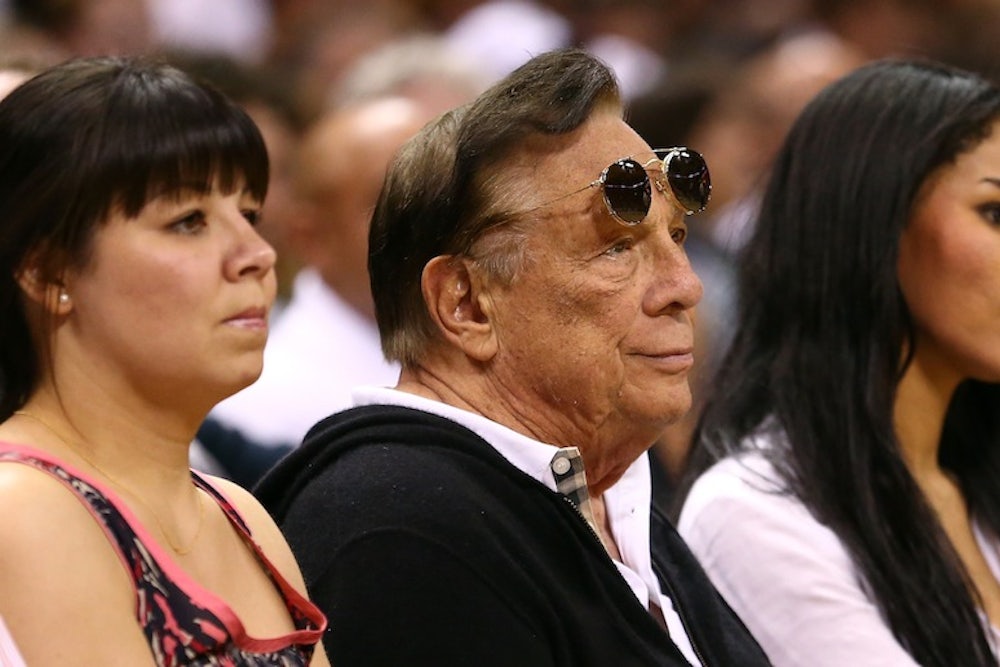In what is truly grotesque news, it appears that the owner of the Los Angeles Clippers, Donald Sterling, told a female friend, "It bothers me a lot that you want to broadcast that you’re associating with black people.” In reference to some of her Instagram postings, he added, “You don’t have to have yourself with, walking with black people.” Quite clearly revealing that he cannot stay away from the subject, he continued, referencing Magic Johnson, “Don’t put him on an Instagram for the world to have to see so they have to call me. And don’t bring him to my games. Yeah, it bothers me a lot that you want to promo, broadcast that you’re associating with black people. Do you have to?”
The response from the NBA, which is in the midst of the most exciting first round of its playoffs in decades, has been swift. LeBron James and Magic Johnson have spoken out forcefully, and Commissioner Adam Silver is pledging to investigate. Obviously Sterling is entitled to defend himself, although his initial deny was awfully weak. It seems probable that he will not be owning an NBA team next season. (I urge people to listen to the entire disgusting, bizarre recording.)
Sterling has long been known as an atrocious NBA owner (although this year his team is quite good) and a rather unlovely character, but this tape is likely to destroy his reputation entirely, and rightfully so. But while the outrage over his comments is understandable and necessary, it also shines a light on an uncomfortable fact: society reacts much more forcefully to lone outbursts like Sterling's than larger, institutional racial problems.
To explain what I mean, here is a quote from a Forbes piece on Sterling, which goes into some of his history:
The laundry list of Sterling’s misdeeds include a housing discrimination lawsuit he settled for $2.7 million with the government where he was accused of not renting apartments to Hispanics and blacks. He was sued in 2006 by the Justice Department for allegations of housing discrimination in the Koreatown part of Los Angeles. Sterling was sued by longtime Clippers general manager Elgin Baylor for wrongful termination alleging racial and age discrimination after Baylor lost his job.
Now try this:
Another federal lawsuit filed in 2003 by the Housing Rights Center and 19 tenants accused Sterling of once stating his preference not to rent to Latinos because “Hispanics smoke, drink and just hang around the building.” The lawsuit also accused him of saying “black tenants smell and attract vermin.”
It's true that Baylor's case was rejected, and it's also true that Sterling settled the discrimination suits. And yet did you know about these accusations? How involved was the NBA? Were they nationwide stories? Sterling was accused of two of the most institutionally harmful forms of racism in our society: hiring/firing discrimination and housing discrimination. And yet's it's fair to say that the housing discrimination case, no matter how it had played out in court, would not have caused the stir that these comments did.
This is partially because there is audio of his recent remarks, and they are thus easier to react against. But it also shows how much more at ease people are responding to something so easy to grasp, and so unthreatening to the status quo. Institutional racism is just too daunting and widespread. A lot of people who don't consider themselves racists nevertheless don't particularly want to live in minority neighborhoods, or send their kids to overwhelmingly non-white schools. And they may hold certain stereotypes about minorities. Confronting all this is complex and fraught. Sterling's alleged comments are just so...simple.
The response to Donald Sterling has been wonderfully aggressive and robust. But there are bigger racial problems in the country than people privately spouting sinister garbage to their friends. And they deserve to be confronted, too.
